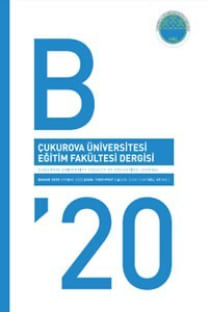The Relationship Between Proficiency in a Second Language and Critical Thinking Skills
Bu çalışmanın başlıca amacı yabancı bir dilde yeterlilik ile eleştirel düşünme arasındaki ilişkiyi araştırmak ve buna bağlı olarak yabancı dil öğrenme sürecinde bireylerin başvurdukları öğrenme stratejileri ve bu stratejilerin eleştirel düşünme üzerindeki etkisini vurgulamaktır. Çıkarım, hipotez test etme, sonuç çıkarma, vb. yabancı dil öğrenme stratejileri, eleştirel düşünmenin özellikleri arasında yer almaktadır. Bu stratejilerin etkin bir biçimde kullanımları hem yabancı dil öğrenimine, hem de eleştirel düşünme becerilerine katkıda bulunabilir. Yabancı dil öğrenme sürecinde birey, bilişsel stratejilere başvurur. Yabancı dil öğrenmek, bireylerin eleştirel düşünme becerilerini artırabilir. Bu araştırmada, bireylerin yabancı dil düzeyleri arttıkça buna paralel olarak eleştirel düşünme becerilerinin de arttığı görülmüştür Bu çalışma sonucunda yabancı dilin eleştirel düşünmeye olan önemli etkisinin yanışım bireylerin sosyo-ekonomik durumlarının da eleştirel düşünme üzerinde etkili olduğu gözlenmiştir.
The present study focuses mainly on the relationship between proficiency in a secondlanguage and critical thinking skills. In the Adult Second. Language learning process, individuals utilize various language learning strategies, for example inferencing, hypothesis testing, deducting, etc., which correspond to the characteristics of critical thinking. The effective use of these language strategies may contribute to success in language learning as well as critical thinking skills. During the process of second language learning, the learner is engaged in cognitive strategies. This experience of learning a second language may result in an increase of critical thinking ability of second language learners. Our findings indicate that a relationship between language proficiency and critical thinking is existent. Besides language proficiency, family background was found to have an impact on critical thinking skills.
___
- Anderson, R.C., Reynolds, R.E., Schauert, D.L., and Goetz, E.T. (1977). Frameworks for comprehending discourse. American Educational Research Journal, 14, 367-381.
- Austen, J. (1995). Pride and Prejudice. Oxford: Oxford University Press.
- Barnitz, J.G., & Morgan, A.L. (1983). Aspects of schemata and syntax in fifth grade children's inferential reading comprehension of causal relations. Reading Psychology, 4, 337 - 348.
- Barnitz, J.G. (1986). The anaphora jigsaw puzzle in psycholinguistic and readingresearch. In J.W. Irwin (Ed.), Understanding and teaching cohesion comprehension.Newark, DE: International Reading Association.
- Boyle, J.R. (1996). The effects of a cognitive mapping strategy on the literal and inferential comprehension of students with mild disabilities. Learning Disability Quarterly, 19, 86-98.
- Cambourne, B., and Brown, H. (1990). Read and retell. Portsmouth, NH: Heinemann.
- Clark, F.L., Deshler, D.D., Schumaker, J.B., Alley, G.R., and Warner, M.M. (1984). Visual imagery and self-questioning: Strategies to improve comprehension of written material. Journal of Learning Disabilities, 17(3), 145-149.
- Cole, M. ( 1990). Cognitive development and formal schooling: The evidence from crosscultural research. In L. Moll (Ed.), Vygotsky and education: Instructional implications and applications of sociohistorical psychology. Cambridge: CUP.
- Englert, C.S., and Raphael, T.R. (1988). Constructing well-formed prose: Process, structure, and metacognitive knowledge. Exceptional Children, 54, 513-520.
- Lapp, D. and Squire J.R (1991). Handbook of research on teaching the English language arts. New York: MacMillan.
- Pearson, P.D., and Johnson, D. (1978). Teaching Reading Comprehension. New York: Holt, Rinehart and Winston.
- Schwartz, J. (2002). Letting the "CAT" out of the bag! - Types of Testing Used. Paper presented in "New Avenues" The 12th International Conference of IATEFL-Hungary
- Spiro, RJ. (1980). Constructive processes in prose comprehension and recall. In RJ. Spiro, B.C.Bruce, and W.F. Brewer, Theoretical issues in reading comprehension. Hillsdale, NJ: Erlbaum.
- Tompkins, G.E. (1994). Teaching writing: Balancing process and product (2nd ed.). Englewood Cliffs, NJ: Macmillan.
- Turn, G. (1995). Vocabulary improvement through extensive reading. Unpublished master thesis, University of Çukurova.
- Vygotsky, L.S. (1997). Educational psychology. Boca Raton, FL: St. Lucie Press.
- Walker, BJ. (1992). Diagnostic teaching of reading: Techniques for instruction and assessment. New York: Macmillan.
- ISSN: 1302-9967
- Yayın Aralığı: 3
- Başlangıç: 2000
- Yayıncı: Çukurova Üniversitesi Matbaası
